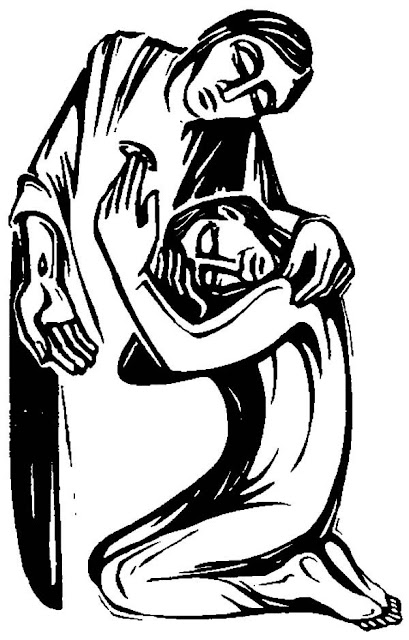Revelation, John, Doubting Thomas, & Acts
Comes round on the three-year cycle every Sunday throughout the Easter Season of Lectionary Year C, our Second Reading is from Ἀποκάλυψις, Apocalypsis, the Book of Revelation. And though I’ve never preached on Revelation, I try to include it in whatever teaching I may be doing that year, Midweek Bible Study the years I did that, or the Adult Sunday School class here, and at the beach and other parishes I served over the years. If you have not, instead of television, take an evening to read Revelation as your Easter offering of praise & thanksgiving.
Revelation is fun! And it is not the ravings of a madman. Clearly, the author, John of Patmos, did not intend it so, but it’s fun to read his entire vision together over several class sessions, start to finish, discussing the Seven Lampstands, and the Beast, and the Seven Seals, and the Number 666, and the horses that sting like scorpions, and other horrifying deadly creatures as we go along!
One thing that makes Revelation fun and riveting is that vivid apocalyptic imagery, much of which Patmos John lifts from Ezekiel and the second half of Daniel: startling, scary, violent, frightening, the stuff of terrifying nightmares.
But studying carefully, we find that Revelation is a good book, yes, a good book. Depending on your point of view, and, frankly, whether you are vengeful to pay back evil, if you’re one of the good guys (as everyone here is), Revelation is a victory story where you get to win, and where you see the bad guys get what’s coming to them in lakes of fire!
There is lots of scare preaching about Revelation, which Patmos John (not likely the same writer as the evangelist who wrote the Gospel according to John, nor the same man as Jesus’ disciple John Zebedee) Patmos John seems to have written maybe 90 to 95 AD, late in the time of the Roman emperor Domitian, whose reign was marked by cruelty, including vicious persecution of Christians. If you’re a good guy who wants to get even, take heart, because there’s payback in Revelation!
Revelation, Greek apokalypsis, the Unveiling, targets three categories of people in that time of persecution: first, bad guys, officialdom (the Roman Empire, Caesar the emperor, the sadists who carry out, and those who enjoy, the persecution); second, more bad guys, those Christians who, under pain and pressure of persecution, give up, give in, surrender, abandon Jesus, deny Christ, sacrifice to the divine Caesar (even temporarily), cowards and traitors who turn away from Jesus and the Church; and third, of course, the good guys, those who stay loyal to Jesus despite the persecution they suffer, torture, even death.
Written to encourage, by horrifying threat, people to stay in the early Christian church, Revelation is the promise of defeat and horrifying punishment for the bad guys, both the persecutors and those Christians who abandon Jesus; but the promise that the good guys, even those who are killed (who will be brought back), the promise that the good guys will share in the ultimate victory of paradise (not in heaven but) on earth, the New Jerusalem, the four-square city where Jesus will reign. Not to preach a “spoiler,” but that’s what Revelation is about.
Revelation is not God or Jesus or even Patmos John, warning about some horrible future that awaits us today, but John Patmos writing about current events in his own time, as I say, about 90 to 95 AD, against Domitian and his persecution. Revelation is about them, then and there, nothing for us to fear. Revelation is not about our day and age as dour, modern-day prophets of doom have tried to make it in every age of human history since the Christian era.
Again, as I say, it’s a great victory story for the good guys, and especially for those of us who like to see the bad guys get what’s coming to them even if it’s Capital. So, enjoy!
The other thing I want to mention this morning is that, for our gospel the Sundays of Easter this year, we’ll be reading from the Gospel according to John. John was a common name then just as it is today; and, again, he’s not the disciple John Zebedee, and he’s not Revelation John of Patmos. Many scholars have tried to make him “John, the beloved disciple”, and maybe so, but I say not! At the end of the gospel, the author tries to identify himself subtly, but ends up anonymous anyway.
In our Easter gospel readings from John, first Doubting Thomas Sunday today. Then a post-Resurrection appearance including Jesus feeds them breakfast on the beach and asks, “Simon, do you love me?” Every year on Easter Four, Jesus offers himself as the good shepherd. Jesus gives the New Commandment of love. Jesus heals an invalid, a sign of Jesus’ lovingkindness, power and authority as God the Son. And our Easter gospels conclude with Jesus and his High Priestly Prayer for those who love him.
That’s not to mention our Easter adventures in the Book of Acts, the apostles preaching Christ crucified, risen and offering salvation as the Christian church takes birth and grows.
Do not miss a Sunday and don’t miss a word - - because Alleluia! Christ is Risen! the Lord is Risen Indeed, Alleluia! and there are blessings for you from the Risen Lord.
++++++++++
Sermon, Homily or Teaching by the Rev Tom Weller in Holy Nativity Episcopal Church, Panama City, Florida on April 28, 2019, the Second Sunday of Easter.
Image: online from Jesuit Clipart
